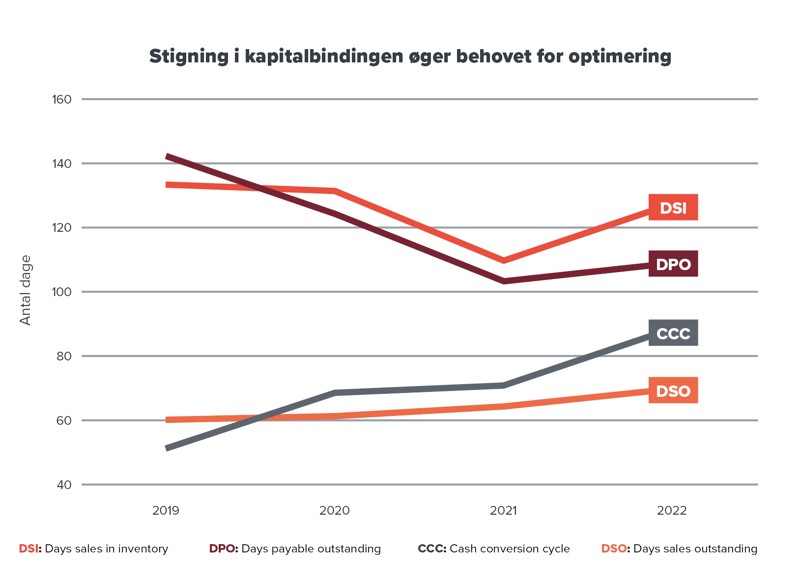Cash resources are crucial for your business and, in recent years, many have experienced an increase in cash tied up in net working capital (NWC). However, NWC has moved too far down on many priority lists. That’s why we present three reasons for placing NWC higher on the agenda, ensuring that your business remains financially healthy.
A new economic reality is upon us, and we experience the highest inflation in decades – both in Denmark and globally.
A recession is looming on the horizon.
But how should you respond to an uncertain economic future?
We would like to offer some insights. We have analysed the Q3 financial statements of non-financial C25 companies, showing a significant increase in the key metric cash conversion cycle (CCC). A key figure that demonstrates your company's ability to convert sales into cash. The figure is based solely on C25 companies, but we assume that other companies have experienced the same trend. Smaller companies may even have been hit harder as their negotiating position is often weaker.
As the figure below shows, the capital tie-up has increased each year since 2019; however, the largest fluctuation has occurred in recent twelve months. During this period, CCC has increased from 71 to 89 days. The largest increase is seen in inventory, which is a natural reaction to the supply challenges experienced by companies twelve months ago.
The economic boom experienced in recent years is probably a closed chapter. It gave companies easy and cheap access to capital, leading to a reduced focus on NWC.
That’s why it is, in our view, time to prioritise NWC again. If we haven’t convinced you yet, we hereby give you three good reasons to incorporate NWC in your plan for the coming year.

1. Rising cost of capital
In a historical context, we have had an incredibly low interest rate for a rather long period of time. It has cost money to have cash reserves, and interest expenses have been almost negligible.
That time is over; inflation has skyrocketed, and so has the interest rate level.
Financing costs have increased significantly in recent twelve months, and it’s highly uncertain how and when we will return to low levels again.
Consequently, it has become considerably more expensive to finance your inventory and accounts receivable.
2. More difficult access to capital
Though we cannot predict the future, it is our expectation that banks' credit policies will be tightened in the coming period compared to previously.
The increased interest rate means that some business cases will be less attractive, and generally, banks will be cautious at a time when the economy is slowing down, and a recession is looming. This also means that companies have difficulties finding the most optimal solution to financing challenges.
"One of the biggest challenges faced in recent years is supply challenges due to stressed supply chains."
3. Stressed supply chains
One of the biggest challenges faced in recent years is supply challenges due to stressed supply chains.
A challenge that involves complications with everything from craftsmen lacking materials and components to cars and electricity/natural gas. There are various reasons for this, and the challenges are spread across many different services and products.
Many have tried to minimise this challenge by purchasing larger volumes for inventory to secure their own customer deliveries.
This is also reflected in the figure, where DSI has increased by eighteen days over a period of twelve months for C25 companies.
As a consequence, many companies now tie up more capital in inventory than twelve months ago, which is a cashflow challenge and, at the same time, an economic risk.
All three reasons are constantly evolving. But what they have in common is that they have brought NWC back on the agenda. Therefore, we recommend that you combine NWC with effective and robust processes, so as to reduce it and to achieve a greater cashflow.
Would you like to have NWC higher on your agenda?
And get an overview of your NWC potential, thereby enabling you to release cash?
Sign up for our series of articles (in Danish) that elaborates on NWC and explains how it is one of the obvious keys to safely navigating the financial reality that lies ahead.
Read this and more articles in our magazine Content here (in Danish).

What can Basico do for you?
You are welcome to contact Senior Partner Casper Oxlund-Mariegaard for a non-binding talk about what we can do for you.

 en
en
 da
da



